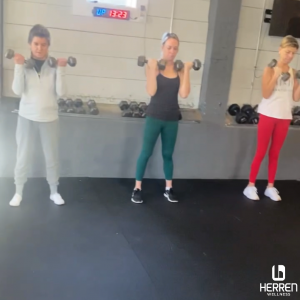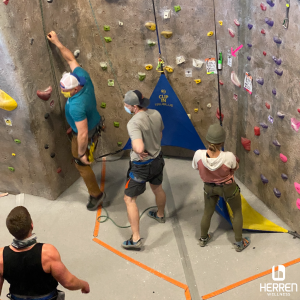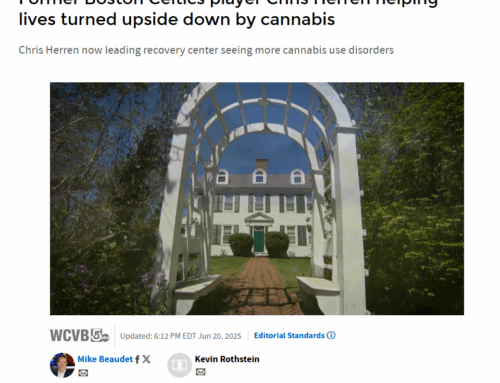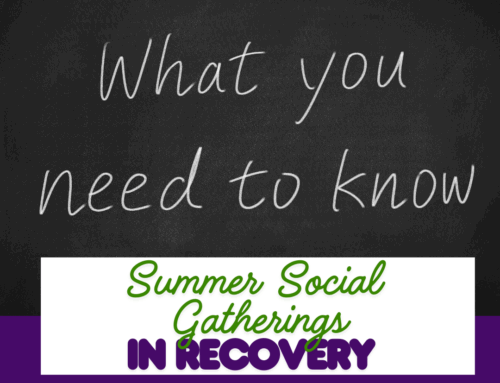
In January of a New Year exercise rises to the top of many priority lists, however at Herren Wellness exercise is always a top priority year-round.
We understand how important exercise is in the recovery process: from improving mood, to fighting cravings, better sleep, and increased self-confidence. What we also see is the unique bond our guests develop with each other in the gym, yoga studio, tennis courts, or during an outing like rock climbing. Exercise is a tool to enhance physical and mental well-being, while cultivating connection essential for recovery.
In this blog we cover five benefits of exercise in recovery that we see in guests at Herren Wellness.
1. Natural Stress Reliever and Anti-Depressant
Oftentimes substance use disorder has co-occurring anxiety and depression. Regular exercise releases endorphins, dopamine, and serotonin in the brain which regulate mood. Mood swings along with anxiety/depression tend to peak in the early recovery stage of withdrawal, so beginning an exercise regimen early in sobriety is a positive way to combat the extremes of emotion. The endorphin rush provided by exercise produces feelings of happiness and euphoria, which are the feelings being chased in active use with drugs and alcohol. Instead of falling back into bad habits people in recovery can use exercise to experience a beneficial “high” that will naturally elevate mood and reduce stress.
2. Boosts Self-Esteem and Motivation
For some, the years of drug and alcohol takes a toll on self-esteem and motivation. Exercise is a great place to start when building a foundation for recovery. One study found that seeing the encouraging results of regular exercise has a positive effect on a sober person’s overall motivation to change behavior. This is significant because recovery requires deep motivation, a willingness to change, and if exercise can encourage this internal shift then it should be considered as a valuable tool in the recovery process. One of the biggest things that drugs and alcohol can take is from a person’s is a sense of self. When incorporating exercise into a person’s recovery it has been shown that merely 20 minutes a day resulted in boosted self-confidence. Regaining a sense of self along with motivation to change and continue on the path of recovery are invaluable takeaways which exercise provides.
3. Helps Develop a Routine
At Herren Wellness we create a schedule each day for guests, and always at the top is exercise either in the gym with trainer Nick, or yoga with Rachel. It is important for our guests to begin their day with exercise because we find that beginning a day intentionally and with structure promotes a routine throughout the rest of the day. When people are struggling with SUD routine oftentimes goes out the window, so it is essential that in recovery a schedule is built. Exercise can be used strategically in sobriety such as booking an early morning class to encourage an earlier bedtime, or booking a class after work to avoid the temptation of happy hour. Some in early recovery will plan for a significant goal such as running a half-marathon, where training will take up time before the big event. However exercise is scheduled it helps structure a routine which promotes good decision-making in recovery.
4. Builds Relationships in Recovery
Connection is essential in recovery, and building new relationships can be hard when starting out. A primary place newly sober people meet other like-minded individuals are recovery meetings, however exercise groups now offer a great place as well. Across the country organizations are emerging focused on bringing together people in recovery with a focus on fitness. The Phoenix, a Denver based nonprofit with locations nationwide, aims to build an active community of sober individuals through peer-led CrossFit, yoga, rock climbing, boxing, running, and hiking events. Created in 2006, it has expanded to offer free programming in a number of states. Phoenix events are open to anyone with at least 48 hours of sobriety, and to supporters of those in recovery. Even if a recovery based exercise program doesn’t exist around you, classes and groups are a sober atmosphere to meet like minded people who are investing in their health. At Herren Wellness we find that guests participating in exercise together lower their guards and open up to not only our trainer Nick, but also each other. This fosters connection which is essential in long-term recovery.

Photo courtesy of The Phoenix
5. Helps to Curb Cravings
Cravings are common in recovery, primarily in the first three months, but can often be an obstacle to sustained sobriety. Research on exercise in recovery has shown that frequent movement can actually help in the reduction of cravings:
- Researchers at Vanderbilt found that after 10 30-minute sessions on a treadmill over a two-week period, heavy marijuana users were able to cut their cravings and cannabis use by more than 50 percent.
- Similar results cited by the National Institute on Drug Abuse occurred in two earlier independent experiments (at the University of Minnesota and the University of Virginia) with cocaine-seeking lab rats. When the rats were made to run on an exercise wheel, they exhibited less cocaine-seeking behavior.
- Exercise decreased drug use among methamphetamine, amphetamine and cocaine users in a study in the journal Frontiers in Psychiatry. (Source)
While cravings may not be avoidable in early recovery, using exercise as a tool has been shown to lower the strong urges and help people overcome them.
At Herren Wellness we understand the impact that exercise can have on the recovery process. When guests arrive with us they are often depleted physically, emotionally, and spiritually, and exercise may not be at the top of their priority list. What we see is a transformation in guests when they begin their day exercising with Nick and Rachel. They can let their guards down and open up while feeling good about themselves and starting the day with connection and support from peers. When asked what his favorite guest story is, Nick described:
One of the coolest things I’ve seen here is a guest who came in really beat up, and I told him he was going to run half a mile. He didn’t think he would ever do it. I talked with him for a while and encouraged him to try working out. He began working out first thing in the morning – about 5am – with a bunch of younger guys, but he didn’t let that stop him. He put in the work. One morning I told him it was time to run half a mile on the treadmill, but he was still unsure. I told him “just don’t stop”.
We played Rocky music, people were cheering him on, and he ran a whole mile – he beat his goal. It was amazing to see him believe in himself and see how the community supported him.

About Herren Wellness
When you come here, you are immediately connected with a thriving community of people at all stages of their recovery journey. We introduce healthy habits and routines centered around emotional, physical, and spiritual wellness that provide a solid foundation for rediscovering your interests, experiencing joy in sobriety, and building structure and routine.
We provide several alumni support communities, including a weekly recovery support group, monthly alumni meeting, and online alumni community you can access anytime. Your connection to Herren Wellness doesn’t end when your stay ends; we are there for you throughout your recovery journey.
If you, or a loved one, are looking for help, please call us at (844) 443-7736, email us at info@herrenwellness.com, or fill out a contact form. You are not alone.





